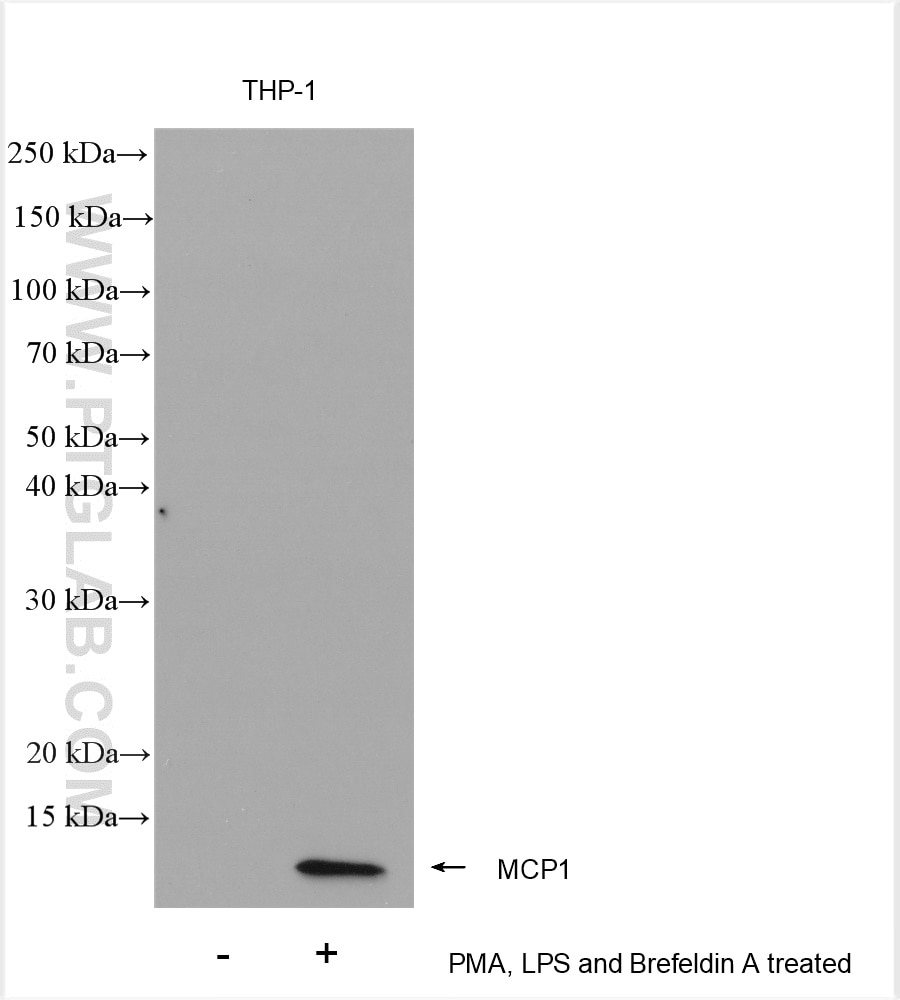Validation Data Gallery
Tested Applications
| Positive WB detected in | PMA, LPS and Brefeldin A treated THP-1 cells |
Recommended dilution
| Application | Dilution |
|---|---|
| Western Blot (WB) | WB : 1:1000-1:4000 |
| It is recommended that this reagent should be titrated in each testing system to obtain optimal results. | |
| Sample-dependent, Check data in validation data gallery. | |
Published Applications
| WB | See 1 publications below |
Product Information
29547-1-AP targets MCP-1/CCL2 in WB, ELISA applications and shows reactivity with human samples.
| Tested Reactivity | human |
| Host / Isotype | Rabbit / IgG |
| Class | Polyclonal |
| Type | Antibody |
| Immunogen |
Recombinant protein 相同性解析による交差性が予測される生物種 |
| Full Name | chemokine (C-C motif) ligand 2 |
| Calculated molecular weight | 99 aa, 11 kDa |
| Observed molecular weight | 11 kDa |
| GenBank accession number | BC009716 |
| Gene Symbol | MCP-1/CCL2 |
| Gene ID (NCBI) | 6347 |
| RRID | AB_2918323 |
| Conjugate | Unconjugated |
| Form | |
| Form | Liquid |
| Purification Method | Antigen affinity purification |
| UNIPROT ID | P13500 |
| Storage Buffer | PBS with 0.02% sodium azide and 50% glycerol{{ptg:BufferTemp}}7.3 |
| Storage Conditions | Store at -20°C. Stable for one year after shipment. Aliquoting is unnecessary for -20oC storage. |
Background Information
MCP-1, ( also named as CCL2) is a member of the chemokine family. MCP-1 recruits monocytes, memory T cells, and dendritic cells to the sites of inflammation produced by either tissue injury or infection. MCP-1 has been implicated in the pathogenesis of diseases characterized by monocytic infiltrates, like psoriasis, rheumatoid arthritis and atherosclerosis. It binds to chemokine receptors CCR2 and CCR4. Elevated expression of MCP-1 is associated with severe acute respiratory syndrome coronavirus 2 infection.
Protocols
| Product Specific Protocols | |
|---|---|
| WB protocol for MCP-1/CCL2 antibody 29547-1-AP | Download protocol |
| Standard Protocols | |
|---|---|
| Click here to view our Standard Protocols |

